Last week, the United States joined the U.K. and Australia in sanctioning and charging a Russian man named Dmitry Yuryevich Khoroshev as the leader of the infamous LockBit ransomware group. LockBit’s leader “LockBitSupp” claims the feds named the wrong guy, saying the charges don’t explain how they connected him to Khoroshev. This post examines the activities of Khoroshev’s many alter egos on the cybercrime forums, and tracks the career of a gifted malware author who has written and sold malicious code for the past 14 years.

Dmitry Yuryevich Khoroshev. Image: treasury.gov.
On May 7, the U.S. Department of Justice indicted Khoroshev on 26 criminal counts, including extortion, wire fraud, and conspiracy. The government alleges Khoroshev created, sold and used the LockBit ransomware strain to personally extort more than $100 million from hundreds of victim organizations, and that LockBit as a group extorted roughly half a billion dollars over four years.
Federal investigators say Khoroshev ran LockBit as a “ransomware-as-a-service” operation, wherein he kept 20 percent of any ransom amount paid by a victim organization infected with his code, with the remaining 80 percent of the payment going to LockBit affiliates responsible for spreading the malware.
Financial sanctions levied against Khoroshev by the U.S. Department of the Treasury listed his known email and street address (in Voronezh, in southwest Russia), passport number, and even his tax ID number (hello, Russian tax authorities). The Treasury filing says Khoroshev used the emails sitedev5@yandex.ru, and khoroshev1@icloud.com.
According to DomainTools.com, the address sitedev5@yandex.ru was used to register at least six domains, including a Russian business registered in Khoroshev’s name called tkaner.com, which is a blog about clothing and fabrics.
A search at the breach-tracking service Constella Intelligence on the phone number in Tkaner’s registration records — 7.9521020220 — brings up multiple official Russian government documents listing the number’s owner as Dmitri Yurievich Khoroshev.
Another domain registered to that phone number was stairwell[.]ru, which at one point advertised the sale of wooden staircases. Constella finds that the email addresses webmaster@stairwell.ru and admin@stairwell.ru used the password 225948.
DomainTools reports that stairwell.ru for several years included the registrant’s name as “Dmitrij Ju Horoshev,” and the email address pin@darktower.su. According to Constella, this email address was used in 2010 to register an account for a Dmitry Yurievich Khoroshev from Voronezh, Russia at the hosting provider firstvds.ru.

Image: Shutterstock.
Cyber intelligence firm Intel 471 finds that pin@darktower.ru was used by a Russian-speaking member called Pin on the English-language cybercrime forum Opensc. Pin was active on Opensc around March 2012, and authored 13 posts that mostly concerned data encryption issues, or how to fix bugs in code.
Other posts concerned custom code Pin claimed to have written that would bypass memory protections on Windows XP and Windows 7 systems, and inject malware into memory space normally allocated to trusted applications on a Windows machine.
Pin also was active at that same time on the Russian-language security forum Antichat, where they told fellow forum members to contact them at the ICQ instant messenger number 669316.
A search on the ICQ number 669316 at Intel 471 shows that in April 2011, a user by the name NeroWolfe joined the Russian cybercrime forum Zloy using the email address d.horoshev@gmail.com, and from an Internet address in Voronezh, RU.
Constella finds the same password tied to webmaster@stairwell.ru (225948) was used by the email address 3k@xakep.ru, which Intel 471 says was registered to more than a dozen NeroWolfe accounts across just as many Russian cybercrime forums between 2011 and 2015.
NeroWolfe’s introductory post to the forum Verified in Oct. 2011 said he was a system administrator and C++ coder.
“Installing SpyEYE, ZeuS, any DDoS and spam admin panels,” NeroWolfe wrote. This user said they specialize in developing malware, creating computer worms, and crafting new ways to hijack Web browsers.

“I can provide my portfolio on request,” NeroWolfe wrote. “P.S. I don’t modify someone else’s code or work with someone else’s frameworks.”
In April 2013, NeroWolfe wrote in a private message to another Verified forum user that he was selling a malware “loader” program that could bypass all of the security protections on Windows XP and Windows 7.
“The access to the network is slightly restricted,” NeroWolfe said of the loader, which he was selling for $5,000. “You won’t manage to bind a port. However, it’s quite possible to send data. The code is written in C.”
In an October 2013 discussion on the cybercrime forum Exploit, NeroWolfe weighed in on the karmic ramifications of ransomware. At the time, ransomware-as-a-service didn’t exist yet, and many members of Exploit were still making good money from “lockers,” relatively crude programs that locked the user out of their system until they agreed to make a small payment (usually a few hundred dollars via prepaid Green Dot cards).
Lockers, which presaged the coming ransomware scourge, were generally viewed by the Russian-speaking cybercrime forums as harmless moneymaking opportunities, because they usually didn’t seek to harm the host computer or endanger files on the system. Also, there were still plenty of locker programs that aspiring cybercriminals could either buy or rent to make a steady income.
NeroWolfe reminded forum denizens that they were just as vulnerable to ransomware attacks as their would-be victims, and that what goes around comes around.
“Guys, do you have a conscience?,” NeroWolfe wrote. “Okay, lockers, network gopstop aka business in Russian. The last thing was always squeezed out of the suckers. But encoders, no one is protected from them, including the local audience.”
If Khoroshev was ever worried that someone outside of Russia might be able to connect his early hacker handles to his real life persona, that’s not clear from reviewing his history online. In fact, the same email address tied to so many of NeroWolfe’s accounts on the forums — 3k@xakep.ru — was used in 2011 to create an account for a Dmitry Yurevich Khoroshev on the Russian social media network Vkontakte.
NeroWolfe seems to have abandoned all of his forum accounts sometime in 2016. In November 2016, an exploit[.]ru member filed an official complaint against NeroWolfe, saying NeroWolfe had been paid $2,000 to produce custom code but never finished the project and vanished.
It’s unclear what happened to NeroWolfe or to Khoroshev during this time. Maybe he got arrested, or some close associates did. Perhaps he just decided it was time to lay low and hit the reset on his operational security efforts, given his past failures in this regard. It’s also possible NeroWolfe landed a real job somewhere for a few years, fathered a child, and/or had to put his cybercrime career on hold.
Or perhaps Khoroshev saw the coming ransomware industry for the endless pot of gold that it was about to become, and then dedicated himself to working on custom ransomware code. That’s what the government believes.
The indictment against Khoroshev says he used the hacker nickname Putinkrab, and Intel 471 says this corresponds to a username that was first registered across three major Russian cybercrime forums in early 2019.
KrebsOnSecurity could find no obvious connections between Putinkrab and any of Khoroshev’s older identities. However, if Putinkrab was Khoroshev, he would have learned from his past mistakes and started fresh with a new identity (which he did). But also, it is likely the government hasn’t shared all of the intelligence it has collected against him (more on that in a bit).
Putinkrab’s first posts on the Russian cybercrime forums XSS, Exploit and UFOLabs saw this user selling ransomware source code written in C.
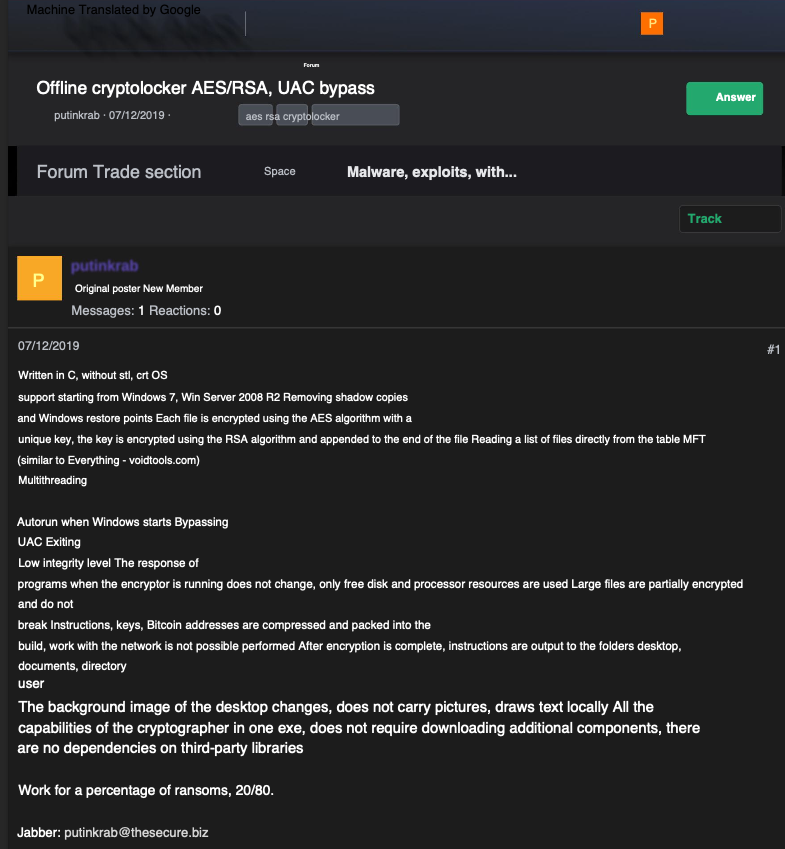
A machine-translated ad for ransomware source code from Putinkrab on the Russian language cybercrime forum UFOlabs in 2019. Image: Ke-la.com.
In April 2019, Putkinkrab offered an affiliate program that would run on top of his custom-made ransomware code.
“I want to work for a share of the ransoms: 20/80,” Putinkrab wrote on Exploit. “20 percent is my percentage for the work, you get 80% of the ransoms. The percentage can be reduced up to 10/90 if the volumes are good. But now, temporarily, until the service is fully automated, we are working using a different algorithm.”
Throughout the summer of 2019, Putinkrab posted multiple updates to Exploit about new features being added to his ransomware strain, as well as novel evasion techniques to avoid detection by security tools. He also told forum members he was looking for investors for a new ransomware project based on his code.
In response to an Exploit member who complained that the security industry was making it harder to profit from ransomware, Putinkrab said that was because so many cybercriminals were relying on crappy ransomware code.
“The vast majority of top antiviruses have acquired behavioral analysis, which blocks 95% of crypto-lockers at their root,” Putinkrab wrote. “Cryptolockers made a lot of noise in the press, but lazy system administrators don’t make backups after that. The vast majority of cryptolockers are written by people who have little understanding of cryptography. Therefore, decryptors appear on the Internet, and with them the hope that files can be decrypted without paying a ransom. They just sit and wait. Contact with the owner of the key is lost over time.”
Putinkrab said he had every confidence his ransomware code was a game-changer, and a huge money machine.
“The game is just gaining momentum,” Putinkrab wrote. “Weak players lose and are eliminated.”
The rest of his response was structured like a poem:
“In this world, the strongest survive.
Our life is just a struggle.
The winner will be the smartest,
Who has his head on his shoulders.”
Putinkrab’s final post came on August 23, 2019. The Justice Department says the LockBit ransomware affiliate program was officially launched five months later. From there on out, the government says, Khoroshev adopted the persona of LockBitSupp. In his introductory post on Exploit, LockBit’s mastermind said the ransomware strain had been in development since September 2019.
The original LockBit malware was written in C (a language that NeroWolfe excelled at). Here’s the original description of LockBit, from its maker:
“The software is written in C and Assembler; encryption is performed through the I/O Completion Port; there is a port scanning local networks and an option to find all DFS, SMB, WebDAV network shares, an admin panel in Tor, automatic test decryption; a decryption tool is provided; there is a chat with Push notifications, a Jabber bot that forwards correspondence and an option to terminate services/processes in line which prevent the ransomware from opening files at a certain moment. The ransomware sets file permissions and removes blocking attributes, deletes shadow copies, clears logs and mounts hidden partitions; there is an option to drag-and-drop files/folders and a console/hidden mode. The ransomware encrypts files in parts in various places: the larger the file size, the more parts there are. The algorithms used are AES + RSA.
You are the one who determines the ransom amount after communicating with the victim. The ransom paid in any currency that suits you will be transferred to your wallets. The Jabber bot serves as an admin panel and is used for banning, providing decryption tools, chatting – Jabber is used for absolutely everything.”
Does the above timeline prove that NeroWolfe/Khoroshev is LockBitSupp? No. However, it does indicate Khoroshev was for many years deeply invested in countless schemes involving botnets, stolen data, and malware he wrote that others used to great effect. NeroWolfe’s many private messages from fellow forum members confirm this.
NeroWolfe’s specialty was creating custom code that employed novel stealth and evasion techniques, and he was always quick to volunteer his services on the forums whenever anyone was looking help on a malware project that called for a strong C or C++ programmer.
Someone with those qualifications — as well as demonstrated mastery of data encryption and decryption techniques — would have been in great demand by the ransomware-as-a-service industry that took off at around the same time NeroWolfe vanished from the forums.
Someone like that who is near or at the top of their game vis-a-vis their peers does not simply walk away from that level of influence, community status, and potential income stream unless forced to do so by circumstances beyond their immediate control.
It’s important to note that Putinkrab didn’t just materialize out of thin air in 2019 — suddenly endowed with knowledge about how to write advanced, stealthy ransomware strains. That knowledge clearly came from someone who’d already had years of experience building and deploying ransomware strains against real-life victim organizations.
Thus, whoever Putinkrab was before they adopted that moniker, it’s a safe bet they were involved in the development and use of earlier, highly successful ransomware strains. One strong possible candidate is Cerber ransomware, the most popular and effective affiliate program operating between early 2016 and mid-2017. Cerber thrived because it emerged as an early mover in the market for ransomware-as-a-service offerings.
In February 2024, the FBI seized LockBit’s cybercrime infrastructure on the dark web, following an apparently lengthy infiltration of the group’s operations. The United States has already indicted and sanctioned at least five other alleged LockBit ringleaders or affiliates, so presumably the feds have been able to draw additional resources from those investigations.
Also, it seems likely that the three national intelligence agencies involved in bringing these charges are not showing all of their cards. For example, the Treasury documents on Khoroshev mention a single cryptocurrency address, and yet experts interviewed for this story say there are no obvious clues connecting this address to Khoroshev or Putinkrab.
But given that LockBitSupp has been actively involved in Lockbit ransomware attacks against organizations for four years now, the government almost certainly has an extensive list of the LockBit leader’s various cryptocurrency addresses — and probably even his bank accounts in Russia. And no doubt the money trail from some of those transactions was traceable to its ultimate beneficiary (or close enough).
Not long after Khoroshev was charged as the leader of LockBit, a number of open-source intelligence accounts on Telegram began extending the information released by the Treasury Department. Within hours, these sleuths had unearthed more than a dozen credit card accounts used by Khoroshev over the past decade, as well as his various bank account numbers in Russia.
The point is, this post is based on data that’s available to and verifiable by KrebsOnSecurity. Woodward & Bernstein’s source in the Watergate investigation — Deep Throat — famously told the two reporters to “follow the money.” This is always excellent advice. But these days, that can be a lot easier said than done — especially with people who a) do not wish to be found, and b) don’t exactly file annual reports.

For nearly a dozen years, residents of South Carolina have been kept in the dark by state and federal investigators over who was responsible for hacking into the state’s revenue department in 2012 and stealing tax and bank account information for 3.6 million people. The answer may no longer be a mystery: KrebsOnSecurity found compelling clues suggesting the intrusion was carried out by the same Russian hacking crew that stole of millions of payment card records from big box retailers like Home Depot and Target in the years that followed.
Questions about who stole tax and financial data on roughly three quarters of all South Carolina residents came to the fore last week at the confirmation hearing of Mark Keel, who was appointed in 2011 by Gov. Nikki Haley to head the state’s law enforcement division. If approved, this would be Keel’s third six-year term in that role.
The Associated Press reports that Keel was careful not to release many details about the breach at his hearing, telling lawmakers he knows who did it but that he wasn’t ready to name anyone.
“I think the fact that we didn’t come up with a whole lot of people’s information that got breached is a testament to the work that people have done on this case,” Keel asserted.
A ten-year retrospective published in 2022 by The Post and Courier in Columbia, S.C. said investigators determined the breach began on Aug. 13, 2012, after a state IT contractor clicked a malicious link in an email. State officials said they found out about the hack from federal law enforcement on October 10, 2012.
KrebsOnSecurity examined posts across dozens of cybercrime forums around that time, and found only one instance of someone selling large volumes of tax data in the year surrounding the breach date.
On Oct. 7, 2012 — three days before South Carolina officials say they first learned of the intrusion — a notorious cybercriminal who goes by the handle “Rescator” advertised the sale of “a database of the tax department of one of the states.”
“Bank account information, SSN and all other information,” Rescator’s sales thread on the Russian-language crime forum Embargo read. “If you purchase the entire database, I will give you access to it.”
A week later, Rescator posted a similar offer on the exclusive Russian forum Mazafaka, saying he was selling information from a U.S. state tax database, without naming the state. Rescator said the data exposed included Social Security Number (SSN), employer, name, address, phone, taxable income, tax refund amount, and bank account number.
“There is a lot of information, I am ready to sell the entire database, with access to the database, and in parts,” Rescator told Mazafaka members. “There is also information on corporate taxpayers.”
On Oct. 26, 2012, the state announced the breach publicly. State officials said they were working with investigators from the U.S. Secret Service and digital forensics experts from Mandiant, which produced an incident report (PDF) that was later published by South Carolina Dept. of Revenue. KrebsOnSecurity sought comment from the Secret Service, South Carolina prosecutors, and Mr. Keel’s office. This story will be updated if any of them respond. Update: The Secret Service declined to comment.
On Nov. 18, 2012, Rescator told fellow denizens of the forum Verified he was selling a database of 65,000 records with bank account information from several smaller, regional financial institutions. Rescator’s sales thread on Verified listed more than a dozen database fields, including account number, name, address, phone, tax ID, date of birth, employer and occupation.
Asked to provide more context about the database for sale, Rescator told forum members the database included financial records related to tax filings of a U.S. state. Rescator added that there was a second database of around 80,000 corporations that included social security numbers, names and addresses, but no financial information.
The AP says South Carolina paid $12 million to Experian for identity theft protection and credit monitoring for its residents after the breach.
“At the time, it was one of the largest breaches in U.S. history but has since been surpassed greatly by hacks to Equifax, Yahoo, Home Depot, Target and PlayStation,” the AP’s Jeffrey Collins wrote.
As it happens, Rescator’s criminal hacking crew was directly responsible for the 2013 breach at Target and the 2014 hack of Home Depot. The Target intrusion saw Rescator’s cybercrime shops selling roughly 40 million stolen payment cards, and 56 million cards from Home Depot customers.
Who is Rescator? On Dec. 14, 2023, KrebsOnSecurity published the results of a 10-year investigation into the identity of Rescator, a.k.a. Mikhail Borisovich Shefel, a 36-year-old who lives in Moscow and who recently changed his last name to Lenin.

Mr. Keel’s assertion that somehow the efforts of South Carolina officials following the breach may have lessened its impact on citizens seems unlikely. The stolen tax and financial data appears to have been sold openly on cybercrime forums by one of the Russian underground’s most aggressive and successful hacking crews.
While there are no indications from reviewing forum posts that Rescator ever sold the data, his sales threads came at a time when the incidence of tax refund fraud was skyrocketing.
Tax-related identity theft occurs when someone uses a stolen identity and SSN to file a tax return in that person’s name claiming a fraudulent refund. Victims usually first learn of the crime after having their returns rejected because scammers beat them to it. Even those who are not required to file a return can be victims of refund fraud, as can those who are not actually owed a refund from the U.S. Internal Revenue Service (IRS).
According to a 2013 report from the Treasury Inspector General’s office, the IRS issued nearly $4 billion in bogus tax refunds in 2012, and more than $5.8 billion in 2013. The money largely was sent to people who stole SSNs and other information on U.S. citizens, and then filed fraudulent tax returns on those individuals claiming a large refund but at a different address.
It remains unclear why Shefel has never been officially implicated in the breaches at Target, Home Depot, or in South Carolina. It may be that Shefel has been indicted, and that those indictments remain sealed for some reason. Perhaps prosecutors were hoping Shefel would decide to leave Russia, at which point it would be easier to apprehend him if he believed no one was looking for him.
But all signs are that Shefel is deeply rooted in Russia, and has no plans to leave. In January 2024, authorities in Australia, the United States and the U.K. levied financial sanctions against 33-year-old Russian man Aleksandr Ermakov for allegedly stealing data on 10 million customers of the Australian health insurance giant Medibank.
A week after those sanctions were put in place, KrebsOnSecurity published a deep dive on Ermakov, which found that he co-ran a Moscow-based IT security consulting business along with Mikhail Shefel called Shtazi-IT.

A Google-translated version of Shtazi dot ru. Image: Archive.org.
It’s not unusual for the data brokers behind people-search websites to use pseudonyms in their day-to-day lives (you would, too). Some of these personal data purveyors even try to reinvent their online identities in a bid to hide their conflicts of interest. But it’s not every day you run across a US-focused people-search network based in China whose principal owners all appear to be completely fabricated identities.
Responding to a reader inquiry concerning the trustworthiness of a site called TruePeopleSearch[.]net, KrebsOnSecurity began poking around. The site offers to sell reports containing photos, police records, background checks, civil judgments, contact information “and much more!” According to LinkedIn and numerous profiles on websites that accept paid article submissions, the founder of TruePeopleSearch is Marilyn Gaskell from Phoenix, Ariz.
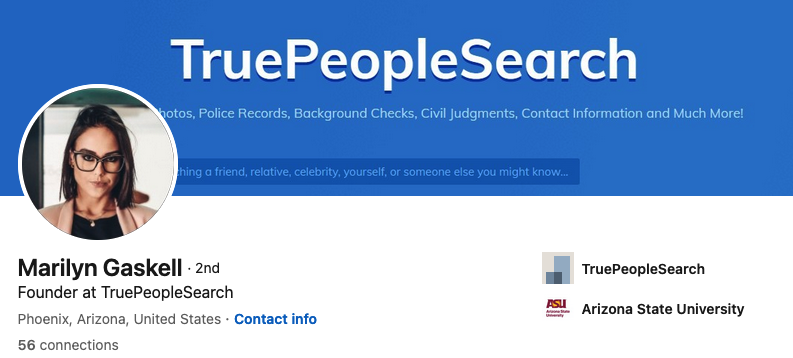
The saucy yet studious LinkedIn profile for Marilyn Gaskell.
Ms. Gaskell has been quoted in multiple “articles” about random subjects, such as this article at HRDailyAdvisor about the pros and cons of joining a company-led fantasy football team.
“Marilyn Gaskell, founder of TruePeopleSearch, agrees that not everyone in the office is likely to be a football fan and might feel intimidated by joining a company league or left out if they don’t join; however, her company looked for ways to make the activity more inclusive,” this paid story notes.
Also quoted in this article is Sally Stevens, who is cited as HR Manager at FastPeopleSearch[.]io.
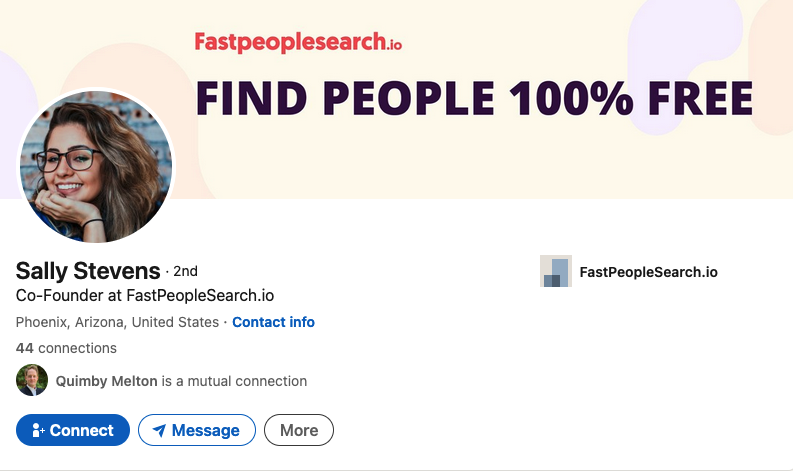
Sally Stevens, the phantom HR Manager for FastPeopleSearch.
“Fantasy football provides one way for employees to set aside work matters for some time and have fun,” Stevens contributed. “Employees can set a special league for themselves and regularly check and compare their scores against one another.”
Imagine that: Two different people-search companies mentioned in the same story about fantasy football. What are the odds?
Both TruePeopleSearch and FastPeopleSearch allow users to search for reports by first and last name, but proceeding to order a report prompts the visitor to purchase the file from one of several established people-finder services, including BeenVerified, Intelius, and Spokeo.
DomainTools.com shows that both TruePeopleSearch and FastPeopleSearch appeared around 2020 and were registered through Alibaba Cloud, in Beijing, China. No other information is available about these domains in their registration records, although both domains appear to use email servers based in China.
Sally Stevens’ LinkedIn profile photo is identical to a stock image titled “beautiful girl” from Adobe.com. Ms. Stevens is also quoted in a paid blog post at ecogreenequipment.com, as is Alina Clark, co-founder and marketing director of CocoDoc, an online service for editing and managing PDF documents.

The profile photo for Alina Clark is a stock photo appearing on more than 100 websites.
Scouring multiple image search sites reveals Ms. Clark’s profile photo on LinkedIn is another stock image that is currently on more than 100 different websites, including Adobe.com. Cocodoc[.]com was registered in June 2020 via Alibaba Cloud Beijing in China.
The same Alina Clark and photo materialized in a paid article at the website Ceoblognation, which in 2021 included her at #11 in a piece called “30 Entrepreneurs Describe The Big Hairy Audacious Goals (BHAGs) for Their Business.” It’s also worth noting that Ms. Clark is currently listed as a “former Forbes Council member” at the media outlet Forbes.com.
Entrepreneur #6 is Stephen Curry, who is quoted as CEO of CocoSign[.]com, a website that claims to offer an “easier, quicker, safer eSignature solution for small and medium-sized businesses.” Incidentally, the same photo for Stephen Curry #6 is also used in this “article” for #22 Jake Smith, who is named as the owner of a different company.

Stephen Curry, aka Jake Smith, aka no such person.
Mr. Curry’s LinkedIn profile shows a young man seated at a table in front of a laptop, but an online image search shows this is another stock photo. Cocosign[.]com was registered in June 2020 via Alibaba Cloud Beijing. No ownership details are available in the domain registration records.
Listed at #13 in that 30 Entrepreneurs article is Eden Cheng, who is cited as co-founder of PeopleFinderFree[.]com. KrebsOnSecurity could not find a LinkedIn profile for Ms. Cheng, but a search on her profile image from that Entrepreneurs article shows the same photo for sale at Shutterstock and other stock photo sites.
DomainTools says PeopleFinderFree was registered through Alibaba Cloud, Beijing. Attempts to purchase reports through PeopleFinderFree produce a notice saying the full report is only available via Spokeo.com.
Lynda Fairly is Entrepreneur #24, and she is quoted as co-founder of Numlooker[.]com, a domain registered in April 2021 through Alibaba in China. Searches for people on Numlooker forward visitors to Spokeo.
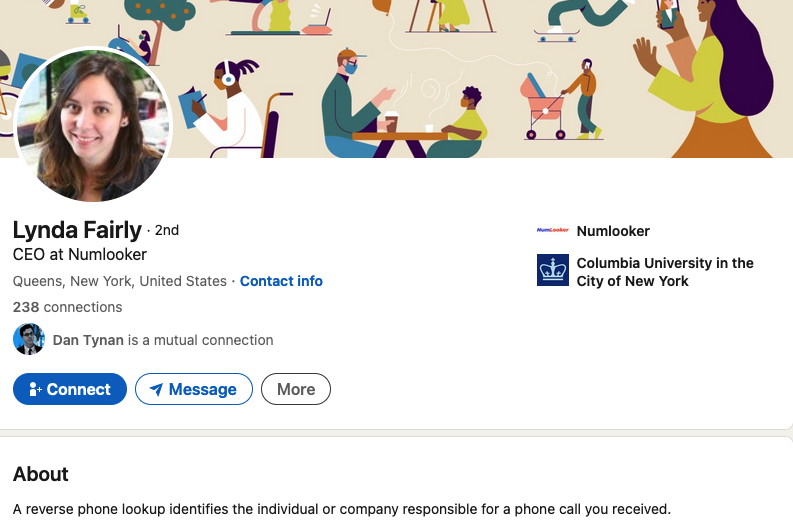
The photo next to Ms. Fairly’s quote in Entrepreneurs matches that of a LinkedIn profile for Lynda Fairly. But a search on that photo shows this same portrait has been used by many other identities and names, including a woman from the United Kingdom who’s a cancer survivor and mother of five; a licensed marriage and family therapist in Canada; a software security engineer at Quora; a journalist on Twitter/X; and a marketing expert in Canada.
Cocofinder[.]com is a people-search service that launched in Sept. 2019, through Alibaba in China. Cocofinder lists its market officer as Harriet Chan, but Ms. Chan’s LinkedIn profile is just as sparse on work history as the other people-search owners mentioned already. An image search online shows that outside of LinkedIn, the profile photo for Ms. Chan has only ever appeared in articles at pay-to-play media sites, like this one from outbackteambuilding.com.
Perhaps because Cocodoc and Cocosign both sell software services, they are actually tied to a physical presence in the real world — in Singapore (15 Scotts Rd. #03-12 15, Singapore). But it’s difficult to discern much from this address alone.
Who’s behind all this people-search chicanery? A January 2024 review of various people-search services at the website techjury.com states that Cocofinder is a wholly-owned subsidiary of a Chinese company called Shenzhen Duiyun Technology Co.
“Though it only finds results from the United States, users can choose between four main search methods,” Techjury explains. Those include people search, phone, address and email lookup. This claim is supported by a Reddit post from three years ago, wherein the Reddit user “ProtectionAdvanced” named the same Chinese company.
Is Shenzhen Duiyun Technology Co. responsible for all these phony profiles? How many more fake companies and profiles are connected to this scheme? KrebsOnSecurity found other examples that didn’t appear directly tied to other fake executives listed here, but which nevertheless are registered through Alibaba and seek to drive traffic to Spokeo and other data brokers. For example, there’s the winsome Daniela Sawyer, founder of FindPeopleFast[.]net, whose profile is flogged in paid stories at entrepreneur.org.
Google currently turns up nothing else for in a search for Shenzhen Duiyun Technology Co. Please feel free to sound off in the comments if you have any more information about this entity, such as how to contact it. Or reach out directly at krebsonsecurity @ gmail.com.
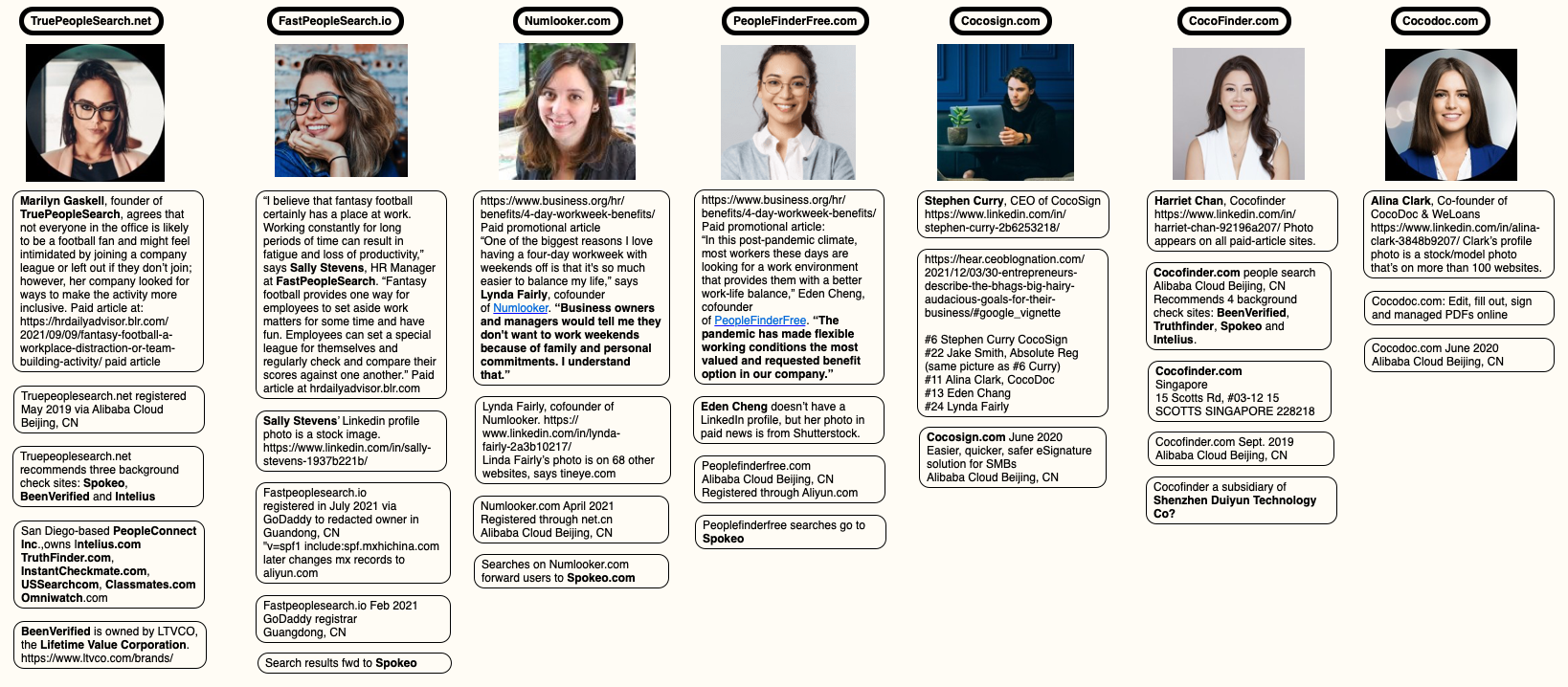
A mind map highlighting the key points of research in this story. Click to enlarge. Image: KrebsOnSecurity.com
It appears the purpose of this network is to conceal the location of people in China who are seeking to generate affiliate commissions when someone visits one of their sites and purchases a people-search report at Spokeo, for example. And it is clear that Spokeo and others have created incentives wherein anyone can effectively white-label their reports, and thereby make money brokering access to peoples’ personal information.
Spokeo’s Wikipedia page says the company was founded in 2006 by four graduates from Stanford University. Spokeo co-founder and current CEO Harrison Tang has not yet responded to requests for comment.
Intelius is owned by San Diego based PeopleConnect Inc., which also owns Classmates.com, USSearch, TruthFinder and Instant Checkmate. PeopleConnect Inc. in turn is owned by H.I.G. Capital, a $60 billion private equity firm. Requests for comment were sent to H.I.G. Capital. This story will be updated if they respond.
BeenVerified is owned by a New York City based holding company called The Lifetime Value Co., a marketing and advertising firm whose brands include PeopleLooker, NeighborWho, Ownerly, PeopleSmart, NumberGuru, and Bumper, a car history site.
Ross Cohen, chief operating officer at The Lifetime Value Co., said it’s likely the network of suspicious people-finder sites was set up by an affiliate. Cohen said Lifetime Value would investigate to determine if this particular affiliate was driving them any sign-ups.
All of the above people-search services operate similarly. When you find the person you’re looking for, you are put through a lengthy (often 10-20 minute) series of splash screens that require you to agree that these reports won’t be used for employment screening or in evaluating new tenant applications. Still more prompts ask if you are okay with seeing “potentially shocking” details about the subject of the report, including arrest histories and photos.
Only at the end of this process does the site disclose that viewing the report in question requires signing up for a monthly subscription, which is typically priced around $35. Exactly how and from where these major people-search websites are getting their consumer data — and customers — will be the subject of further reporting here.
The main reason these various people-search sites require you to affirm that you won’t use their reports for hiring or vetting potential tenants is that selling reports for those purposes would classify these firms as consumer reporting agencies (CRAs) and expose them to regulations under the Fair Credit Reporting Act (FCRA).
These data brokers do not want to be treated as CRAs, and for this reason their people search reports typically don’t include detailed credit histories, financial information, or full Social Security Numbers (Radaris reports include the first six digits of one’s SSN).
But in September 2023, the U.S. Federal Trade Commission found that TruthFinder and Instant Checkmate were trying to have it both ways. The FTC levied a $5.8 million penalty against the companies for allegedly acting as CRAs because they assembled and compiled information on consumers into background reports that were marketed and sold for employment and tenant screening purposes.
The FTC also found TruthFinder and Instant Checkmate deceived users about background report accuracy. The FTC alleges these companies made millions from their monthly subscriptions using push notifications and marketing emails that claimed that the subject of a background report had a criminal or arrest record, when the record was merely a traffic ticket.
The FTC said both companies deceived customers by providing “Remove” and “Flag as Inaccurate” buttons that did not work as advertised. Rather, the “Remove” button removed the disputed information only from the report as displayed to that customer; however, the same item of information remained visible to other customers who searched for the same person.
The FTC also said that when a customer flagged an item in the background report as inaccurate, the companies never took any steps to investigate those claims, to modify the reports, or to flag to other customers that the information had been disputed.
There are a growing number of online reputation management companies that offer to help customers remove their personal information from people-search sites and data broker databases. There are, no doubt, plenty of honest and well-meaning companies operating in this space, but it has been my experience that a great many people involved in that industry have a background in marketing or advertising — not privacy.
Also, some so-called data privacy companies may be wolves in sheep’s clothing. On March 14, KrebsOnSecurity published an abundance of evidence indicating that the CEO and founder of the data privacy company OneRep.com was responsible for launching dozens of people-search services over the years.
Finally, some of the more popular people-search websites are notorious for ignoring requests from consumers seeking to remove their information, regardless of which reputation or removal service you use. Some force you to create an account and provide more information before you can remove your data. Even then, the information you worked hard to remove may simply reappear a few months later.
This aptly describes countless complaints lodged against the data broker and people search giant Radaris. On March 8, KrebsOnSecurity profiled the co-founders of Radaris, two Russian brothers in Massachusetts who also operate multiple Russian-language dating services and affiliate programs.
The truth is that these people-search companies will continue to thrive unless and until Congress begins to realize it’s time for some consumer privacy and data protection laws that are relevant to life in the 21st century. Duke University adjunct professor Justin Sherman says virtually all state privacy laws exempt records that might be considered “public” or “government” documents, including voting registries, property filings, marriage certificates, motor vehicle records, criminal records, court documents, death records, professional licenses, bankruptcy filings, and more.
“Consumer privacy laws in California, Colorado, Connecticut, Delaware, Indiana, Iowa, Montana, Oregon, Tennessee, Texas, Utah, and Virginia all contain highly similar or completely identical carve-outs for ‘publicly available information’ or government records,” Sherman said.
Last week, KrebsOnSecurity broke the news that one of the largest cybercrime services for laundering stolen merchandise was hacked recently, exposing its internal operations, finances and organizational structure. In today’s Part II, we’ll examine clues about the real-life identity of “Fearlless,” the nickname chosen by the proprietor of the SWAT USA Drops service.

Based in Russia, SWAT USA recruits people in the United States to reship packages containing pricey electronics that are purchased with stolen credit cards. As detailed in this Nov. 2 story, SWAT currently employs more than 1,200 U.S. residents, all of whom will be cut loose without a promised payday at the end of their first month reshipping stolen goods.
The current co-owner of SWAT, a cybercriminal who uses the nickname “Fearlless,” operates primarily on the cybercrime forum Verified. This Russian-language forum has tens of thousands of members, and it has suffered several hacks that exposed more than a decade’s worth of user data and direct messages.
January 2021 posts on Verified show that Fearlless and his partner Universalo purchased the SWAT reshipping business from a Verified member named SWAT, who’d been operating the service for years. SWAT agreed to transfer the business in exchange for 30 percent of the net profit over the ensuing six months.
Cyber intelligence firm Intel 471 says Fearlless first registered on Verified in February 2013. The email address Fearlless used on Verified leads nowhere, but a review of Fearlless’ direct messages on Verified indicates this user originally registered on Verified a year earlier as a reshipping vendor, under the alias “Apathyp.”
There are two clues supporting the conclusion that Apathyp and Fearlless are the same person. First, the Verified administrators warned Apathyp he had violated the forum’s rules barring the use of multiple accounts by the same person, and that Verified’s automated systems had detected that Apathyp and Fearlless were logging in from the same device. Second, in his earliest private messages on Verified, Fearlless told others to contact him on an instant messenger address that Apathyp had claimed as his.
Intel 471 says Apathyp registered on Verified using the email address triploo@mail.ru. A search on that email address at the breach intelligence service Constella Intelligence found that a password commonly associated with it was “niceone.” But the triploo@mail.ru account isn’t connected to much else that’s interesting except a now-deleted account at Vkontakte, the Russian answer to Facebook.
However, in Sept. 2020, Apathyp sent a private message on Verified to the owner of a stolen credit card shop, saying his credentials no longer worked. Apathyp told the proprietor that his chosen password on the service was “12Apathy.”
A search on that password at Constella reveals it was used by just four different email addresses, two of which are particularly interesting: gezze@yandex.ru and gezze@mail.ru. Constella discovered that both of these addresses were previously associated with the same password as triploo@mail.ru — “niceone,” or some variation thereof.
Constella found that years ago gezze@mail.ru was used to create a Vkontakte account under the name Ivan Sherban (former password: “12niceone“) from Magnitogorsk, an industrial city in the southern region of Russia. That same email address is now tied to a Vkontakte account for an Ivan Sherban who lists his home as Saint Petersburg, Russia. Sherban’s profile photo shows a heavily tattooed, muscular and recently married individual with his beautiful new bride getting ready to drive off in a convertible sports car.
A pivotal clue for validating the research into Apathyp/Fearlless came from the identity intelligence firm myNetWatchman, which found that gezze@mail.ru at one time used the passwords “геззи1991” (gezze1991) and “gezze18081991.”
Care to place a wager on when Vkontakte says is Mr. Sherban’s birthday? Ten points if you answered August 18 (18081991).
Mr. Sherban did not respond to multiple requests for comment.
Authorities in the United States, Germany, the Netherlands and the U.K. last week said they dismantled the “RSOCKS” botnet, a collection of millions of hacked devices that were sold as “proxies” to cybercriminals looking for ways to route their malicious traffic through someone else’s computer. While the coordinated action did not name the Russian hackers allegedly behind RSOCKS, KrebsOnSecurity has identified its owner as a 35-year-old Russian man living abroad who also runs the world’s top spam forum.
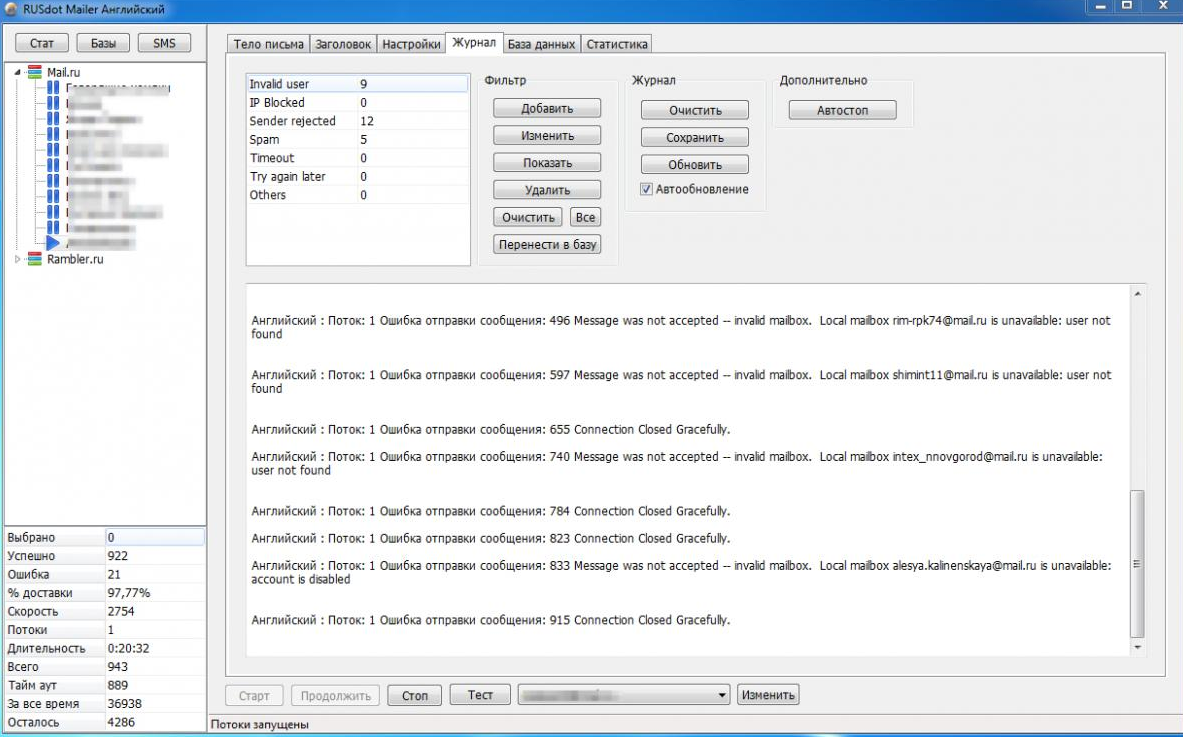
The RUSdot mailer, the email spamming tool made and sold by the administrator of RSOCKS.
According to a statement by the U.S. Department of Justice, RSOCKS offered clients access to IP addresses assigned to devices that had been hacked:
“A cybercriminal who wanted to utilize the RSOCKS platform could use a web browser to navigate to a web-based ‘storefront’ (i.e., a public web site that allows users to purchase access to the botnet), which allowed the customer to pay to rent access to a pool of proxies for a specified daily, weekly, or monthly time period. The cost for access to a pool of RSOCKS proxies ranged from $30 per day for access to 2,000 proxies to $200 per day for access to 90,000 proxies.”
The DOJ’s statement doesn’t mention that RSOCKS has been in operation since 2014, when access to the web store for the botnet was first advertised on multiple Russian-language cybercrime forums.
The user “RSOCKS” on the Russian crime forum Verified changed his name to RSOCKS from a previous handle: “Stanx,” whose very first sales thread on Verified in 2016 quickly ran afoul of the forum’s rules and prompted a public chastisement by the forum’s administrator.
Verified was hacked twice in the past few years, and each time the private messages of all users on the forum were leaked. Those messages show that after being warned of his forum infraction, Stanx sent a private message to the Verified administrator detailing his cybercriminal bona fides.
“I am the owner of the RUSdot forum (former Spamdot),” Stanx wrote in Sept. 2016. “In spam topics, people know me as a reliable person.”
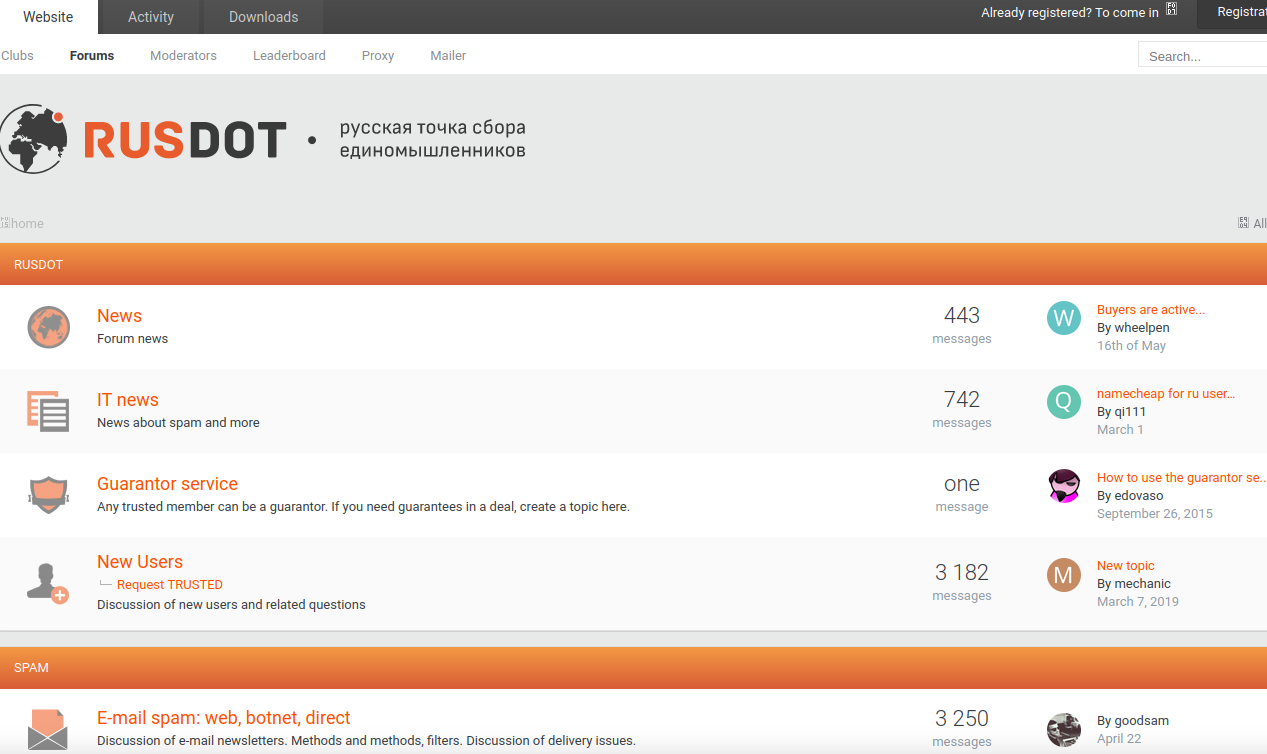
A Google-translated version of the Rusdot spam forum.
RUSdot is the successor forum to Spamdot, a far more secretive and restricted forum where most of the world’s top spammers, virus writers and cybercriminals collaborated for years before the community’s implosion in 2010. Even today, the RUSdot Mailer is advertised for sale at the top of the RUSdot community forum.
Stanx said he was a longtime member of several major forums, including the Russian hacker forum Antichat (since 2005), and the Russian crime forum Exploit (since April 2013). In an early post to Antichat in January 2005, Stanx disclosed that he is from Omsk, a large city in the Siberian region of Russia.
According to the cyber intelligence firm Intel 471, the user Stanx indeed registered on Exploit in 2013, using the email address stanx@rusdot.com, and the ICQ number 399611. A search in Google for that ICQ number turns up a cached version of a Vkontakte profile for a Denis “Neo” Kloster, from Omsk, Russia.
Cybersecurity firm Constella Intelligence shows that in 2017, someone using the email address istanx@gmail.com registered at the Russian freelancer job site fl.ru with the profile name of “Denis Kloster” and the Omsk phone number of 79136334444. Another record indexed by Constella suggests Denis’s real surname may in fact be “Emilyantsev” [Емельянцев].
That phone number is tied to the WHOIS registration records for multiple domain names over the years, including proxy[.]info, allproxy[.]info, kloster.pro and deniskloster.com.

A copy of the passport for Denis Kloster, as posted to his Vkontakte page in 2019. It shows that in Oct. 2019, he obtained a visa from the American Embassy in Bangkok, Thailand.
The “about me” section of DenisKloster.com says the 35-year-old was born in Omsk, that he got his first computer at age 12, and graduated from high school at 16. Kloster says he’s worked in many large companies in Omsk as a system administrator, web developer and photographer.
According to Kloster’s blog, his first real job was running an “online advertising” firm he founded called Internet Advertising Omsk (“riOmsk“), and that he even lived in New York City for a while.
“Something new was required and I decided to leave Omsk and try to live in the States,” Kloster wrote in 2013. “I opened an American visa for myself, it was not difficult to get. And so I moved to live in New York, the largest city in the world, in a country where all wishes come true. But even this was not enough for me, and since then I began to travel the world.”
The current version of the About Me page on Kloster’s site says he closed his advertising business in 2013 to travel the world and focus on his new company: One that provides security and anonymity services to customers around the world. Kloster’s vanity website and LinkedIn page both list him as CEO of a company called “SL MobPartners.”
In 2016, Deniskloster.com featured a post celebrating three years in operation. The anniversary post said Kloster’s anonymity business had grown to nearly two dozen employees, most of whom were included in a group photo posted to that article (and some of whom Kloster thanked by their first names and last initials).
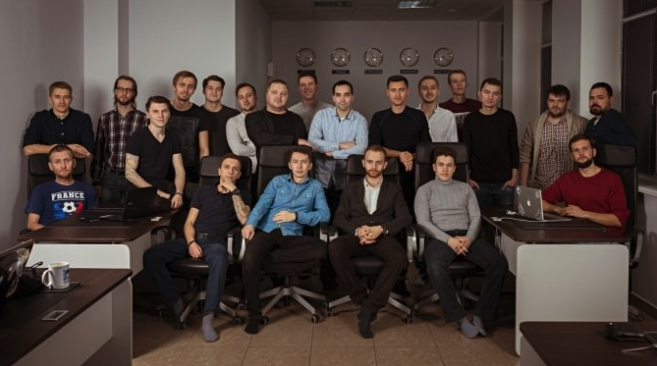
The employees who kept things running for RSOCKS, circa 2016.
“Thanks to you, we are now developing in the field of information security and anonymity!,” the post enthuses. “We make products that are used by thousands of people around the world, and this is very cool! And this is just the beginning!!! We don’t just work together and we’re not just friends, we’re Family.”
Mr. Kloster did not respond to repeated requests for comment.
It’s not clear if the coordinated takedown targeting the RSOCKS botnet will be permanent, as the botnet’s owners could simply rebuild — and possibly rebrand — their crime machine. Based on the RSOCKS owner’s posts, that is exactly what they intend to do.
“RSocks ceases to exist,” wrote the Rsocks account on the BlackHatWorld forum on June 17. “But don’t worry. All the active plans and fund balances will be transferred to another service. Stay tuned. We will inform you about its name and all the details later.”
Malware-based proxy services like RSOCKS have struggled to remain competitive in a cybercrime market with increasingly sophisticated proxy services that offer many additional features. The demise of RSOCKS follows closely on the heels of VIP72[.]com, a competing proxy botnet service that operated for a decade before its owners pulled the plug on the service last year.